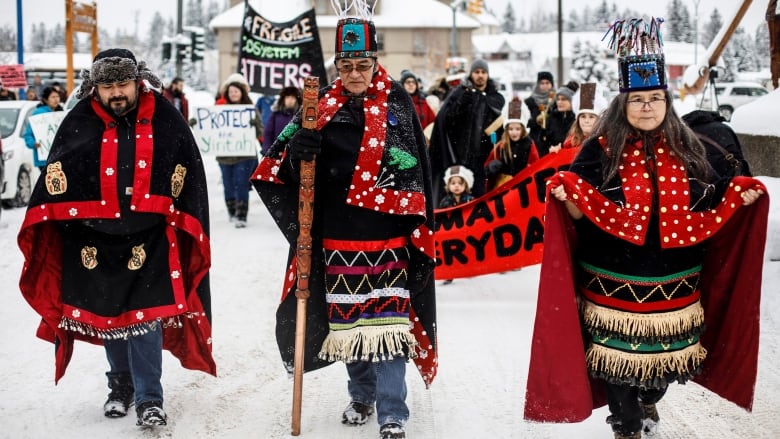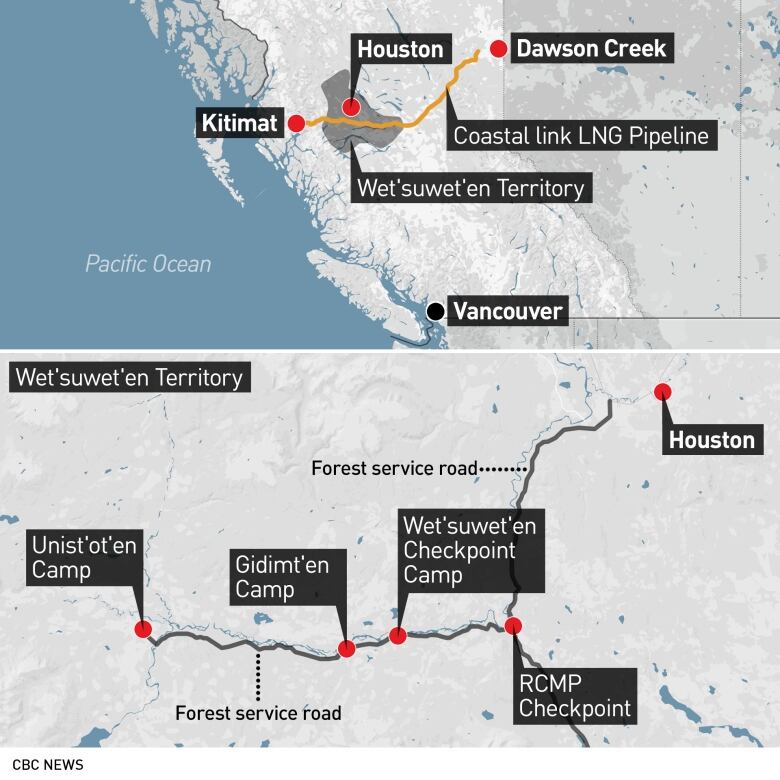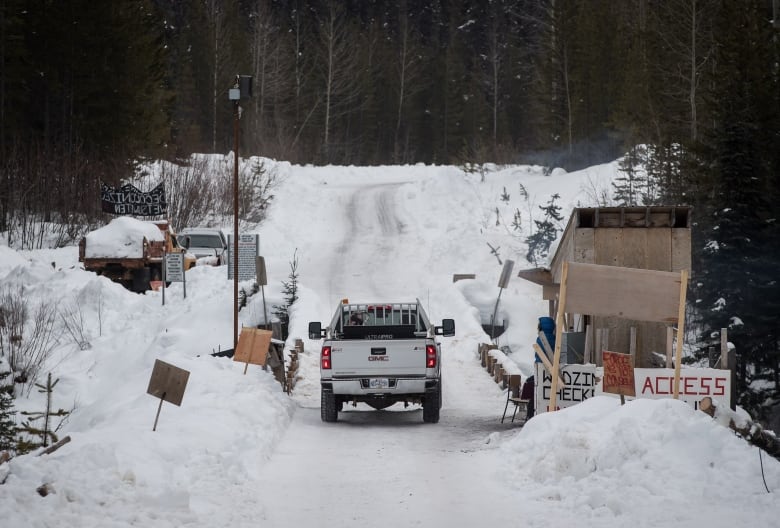Coastal GasLink returning to work in injunction area in Wet'suwet'en territory
RCMP continues to maintain exclusion zone checkpoint on forest service road

Coastal GasLink announced it's getting back to work in the area subject to a B.C. Supreme Court injunction this week as RCMP announce the force has concluded "major enforcement" actions.
Those actions sawa total of 28 people arrested between Thursday and Monday as police moved in to ensure people and obstructions were removed from the Morice Forest Service Road, so that Coastal GasLink and its contractors could move freely through the area for construction activities.
Police maintained their exclusion zone on the territory Tuesday, restricting who is able to travel down the forest service road and into the area.
It's unclear how many people still remain within that exclusion zone, in places like the Unist'ot'en healing centre. People at the centre have been posting updates to social media about the presence of police and Coastal GasLink contractors moving through the area.
There were no reports of additional arrests by midday on Tuesday.
Of the 28 peoplearrested, the B.C. Prosecution Service said thatas of Tuesday, no criminal charges have been laid against those individuals.
The $6-billion, 670-kilometre Coastal GasLink pipeline has received approval from the province, and 20 First Nations band councils have signed agreements for the project, including five of the six band councils in the Wet'suwet'en Nation.
However, the Wet'suwet'en hereditary chiefs say those band councils are only responsible for the territory within their individual reserves because their authority comes only from the Indian Act. The hereditary chiefs leaders in place before the Indian Act assert authority over 22,000 square kilometres of the nation's traditional territory, an area recognized as unceded by the Supreme Court of Canada in a 1997 decision.

As it stands, the chiefs do not have access to freely move through that territory, while the enforcement of the B.C. Supreme Court injunction continues.
On Tuesday, Wet'suwe'ten hereditary chief Na'moks said he would be spending the afternoon at the provincial courthouse in Smithers, to show support to one of the 28 arrested, who was scheduled to make a court appearance.
He said the arrests this week, in particular of the women at Unist'oten Monday, has been both a source of pride and heartbreak.
"We're doing the right thing," he said.
Coastal GasLinksaid in a statement on Tuesday "We are extremely disappointed enforcement was required to reopen the Morice River Forest Service Road but will redouble efforts to engage with the Hereditary Chiefs of the Wet'suwet'en and with the Unist'ot'en in search of a peaceful, long term resolution that benefits the Wet'suwet'en people."

The Wet'suwet'en hereditary chiefs have maintained for weeks that they're not interested in meeting with the company and instead want to sit down and meet nation-to-nation with decision makers in the B.C. and federal governments.
Na'moks said leaders from B.C. and Ottawa are not engaging with them.
"The leader of this province nor the leader of this country they were far too important to talk to us. And the world is watching."
Ina statement to CBC News on Tuesday, the press secretary to federal Minister of Natural Resources Seamus O'Regan said the dispute over the Coastal GasLink pipeline "remains fully under provincial jurisdiction."
"We encourage all the parties involved to work together towards a solution."
B.C. Premier John Horgan also released a statementTuesday afternoon, after cancelling a planned news conference following the government's speech from the thronedue to demonstrationsoutside the B.C. Legislature in support of the Wet'suwet'en.
He said people have the right to be take part in peaceful protests"within the law" and that he understands the frustration of those who are experiencing disruptions as a result of these demonstrations.
Speaking specifically about the ongoing conflict over the Coastal GasLink pipeline,Horgan said the government attempted to find a peaceful resolution by sending Minister of Indigenous Relations and Reconciliation Scott Fraser to meet with the hereditary chiefs. He said Fraser "met on an urgent basis for two days in February in an effort to find a peaceful resolution to the impasse regarding the Coastal GasLink project. Regrettably, the talks were unsuccessful."
Horgan said the province remains committed to engaging with the Wet'suwet'en hereditary chiefs, saying that B.C. is engaged in "ongoing reconciliation discussions" with them"which are focused on rights, title, self-government and self-determination."
In a statement emailed to media outlets,Coastal Gaslink committedthat, as workers return to the area, the company will take steps to ensure people at the Unist'ot'en healing centre remain safe.The company said it will be doing things like providing advance notice to the centre about when workers will be moving through the area.
The company saidapproximately two dozenWet'suwet'en people have jobs attached to the project.
While pipeline workersget back to work in the area,the hereditary chiefs remain firm in their opposition to the project.
Na'moks said the hereditary chiefs remain committed to asserting Wet'suwet'en law and that this conflict is not a simple dichotomy of pro- and anti-pipeline sentiments.
"It is about rights and title. It's also about Indigenous rights. It's about human rights," he said.
As of Tuesday, the RCMP said in a statement it will maintain its presence in the area, monitoring what's happening in the Morice West Forest Service Road, "to ensure it remains open and free from obstructions."
The statement also said that it will maintain its exclusion zone and access control point until Coastal GasLink confirms "the road and infrastructure are deemed safe and ready for full access."













_(720p).jpg)


 OFFICIAL HD MUSIC VIDEO.jpg)
.jpg)



























































































